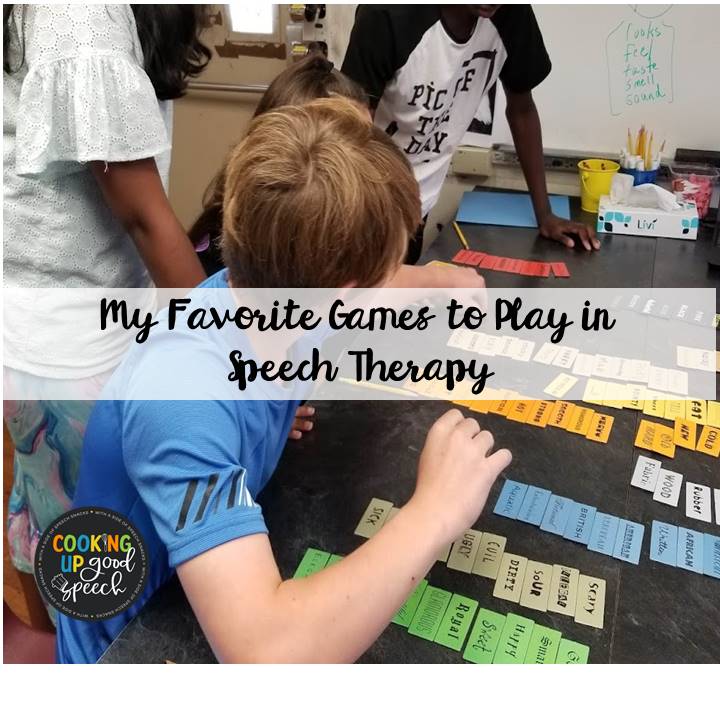
Disclaimer: This post contains affiliate links!
Find a comprehensive collection of game suggestions for older students in my AMAZON STORE.
I work with a large population of middle/high school students and believe me, they love games just as much as the little kids do–maybe even more! I don’t make a habit of using games on a daily basis, but sometimes it can be challenging to motivate and engage an older student, and using games in therapy definitely helps get the job done. I make sure the game has a PURPOSE and focuses on the GOALS we are targeting. SLPs are so great at making a challenging task appear fun by disguising it in a game format! There are so many great games that target so many language goals so I know I am providing my students with a meaningful experience when we use games in our sessions! Sometimes we play by the game rules, but most of the time, I customize the game to the needs of my students and usually go “off script!” And here’s a way to get your older students to take the lead—give them the game and ask them to figure out the rules —you can give them the game rules booklet to read on their own or just give them the game WITHOUT ANY RULES and see what they come up with! You might be surprised by how creative they get with their own game rules and ideas for playing. I love board games for another reason— they are low-tech and focus on conversation, turn-taking, executive functioning, and all things language!
So here are my favorite go-to games that I use in my therapy room with my “big kids.”
#1. BUBBLE TALK

This board game asks players to match hilarious captions with funny pictures. Each player draws seven random caption cards. The judge for that round draws a picture card and players must quickly try to match the funniest caption they have to the picture. The player who makes the judge laugh the most wins that round.
*OPTIONAL IDEA: I give speech bubble sticky notes to my students to write what they think the person (or animal) in the scene might be thinking. It’s a great way to work on inferential thinking skills as well as humourous language!
#2. SMART MOUTH
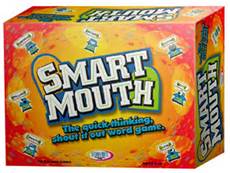
I love this game for working on categorizing, vocabulary building, and parts of speech. The dealer rolls the die to determine the category for the game. There are 6 categories including adjectives, natural objects, man-made objects, verbs, famous people, and free play. The dealer reveals two letter tiles and everyone tries to come up with valid words that fit into that category! Players get 60 seconds to come up with as many words as possible! My kids get so competitive—this game keeps them engaged and teaches quick thinking as well. I’ve also customized this game to my student’s needs and focused on one or just a couple of categories. Once all tiles are gone, the player with the most tiles wins!
#3 FUNGLISH
I love this game simply for the 120 adjective tiles that are included. (I have used them separately for building descriptive sentences.) The goal of the game is to describe a word on the separate word cards provided. Once you have decided which adjectives best describes your word, the other players must guess what the original word was. This is a great game for focusing on attributes, categorization, and descriptors. The kids will never realize how much learning is going on while they play!

#4. SCRIBBLISH
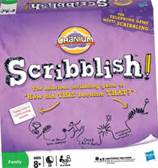
Not only do my students like this game, but this was a favorite of my son when he was younger. He always requested it on “family game night.” I love so many of the Cranium games! This one requires a little creativity, but not a lot of artistic skill. In fact, the less artistic, the funnier the outcomes. The whole point of the game is to try and scribble something that resembles the ridiculous phrase on the card you start with (i.e. “I’m secretly a mermaid,” or “Look, I invented a Time Machine” ). Then you pass your drawing, and get someone else’s drawing and write a phrase for that (whatever it looks like, you just describe it). As SLP’s we basically already use this strategy when we teach our students new words. Drawing a word, phrase, sentence or idea helps them to recall, retain and understand—this game just takes it to another level by presenting phrases that naturally result in very funny outcomes.
#5. PICWITS!
This game is perfect for addressing inferencing skills! For this game, players try to match their picture cards with the judge’s caption card. Each player holds six cards with photos on them. One player draws a card with a caption that may say something like “I can’t believe I ate the whole thing.” The other players will then select which of their six photos best fits that caption, or that they think the person holding the caption might choose. The player with the caption then selects their favorite, and the person who submitted that photo gets a point for winning that round. Picwits is a great way to make discussing inferences fun, interactive, and a bit competitive too—-and I have a lot of students who seem very motivated by some friendly competition!
#6. BATTLESHIP
This one is an oldie but goodie and I consider it the ultimate in barrier games!!! And with so many boys on my caseload, it’s a big hit in my speech room! Battleship is great for addressing critical thinking skills, organization, reasoning, logic, and strategy. It’s also great for working on maintaining attention and turn-taking. As you can see, the number of target areas that you can address for this game are pretty endless! This game would also be great for sneaking in some articulation practice as students would be required to practice their sound, word, phrase, sentence in between turns. If you have a small group of 1-2 students, this game is ideal, but you can certainly form teams if there are larger numbers of students in a group. If you haven’t’ played this game growing up, the rules are simple. You must figure out the location of the opponent’s battleships by calling out coordinates on the grid. In turn, the other player is trying to figure out where your ships are hidden as well. The game can become lengthy so you may find yourself needing to pick up where you left off in your next session!
#7. APPLES TO APPLES

There are so many ways you can play this game. In the traditional directions, the judge picks a green apple card from the top of the stack, reads the word aloud, and places it face-up on the table. Players choose the red apple card
from their hand that is best described by the word on the green apple card played by the judge. Players place these red apple cards face down on the table. The judge mixes the red apple cards so no one knows who
played which card and then turns over each red apple card, reads it aloud, and selects the one he or she thinks is
best described by the word on the green apple card. The player of the selected red apple card is awarded the green apple card played by the judge.
OPTIONAL IDEAS: I use the fantastic words on the green game cards to address vocabulary and sentence building, synonyms, antonyms. I use the red and green cards in combination by having students match green cards (these are mainly adjectives) that describe red cards (nouns). We also search for green cards that are opposite in meaning and discuss why. There are so many great variations, these are just a few. I always throw in a whiteboard and some cool dice when I play card games like this. They earn rolls for correct answers and/or good effort. Dice are a huge motivator with older students!
#8. Make-Your-Own File Folder Game
Sometimes you just have to start from scratch to gain your older student’s attention and interest. This file folder game has a lacrosse theme. My student loves lacrosse so he enjoyed designing this board and the rules, with some assistance. He picked his favorite teams and planned the layout. He was proud of his finished product, which made it so much easier for me to work on his language goals as he navigated the game board. Not only did we address specific language goals related to vocabulary and comprehension using his creation, but he (unknowingly) was also working on his executive functioning—by planning out the design, organizing the layout, maintaining attention, and perseverance.


#9. Cariboo
This game is a HOT commodity! If you are lucky enough to have a copy, you know how much your younger students love playing all the speech games (many can be found on Teacher Pay Teachers. But did you know the BIG KIDS love Cariboo too! And if you would like to know how you can address vocabulary building for older students with this game, check out this product in my TpT store! According to Beck et al. (Bringing Words to Life) “…students become interested and enthusiastic about words when instruction is rich and lively…” I think this game fits the bill when it comes to making learning new words fun and interesting!
Use this as your go-to vocabulary activity. Each month teach your students 15 new meaningful words that are directly related to timely and seasonal themes. You’ll only need to change the cards out once per month and can review them over and over all month long to be sure your students achieve mastery and are gaining a deeper understanding of the words. The game includes several strategy cards for learning new vocabulary as well as data collection sheets and student response sheets for sentence writing. I hope you enjoy Cariboo as much as my older students—remember, when it comes to fun and learning, they are just little kids in bigger bodies so through in a game into your therapy sessions every once in a while and it will go a long way!


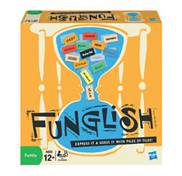
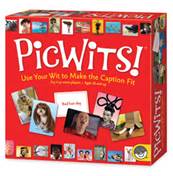
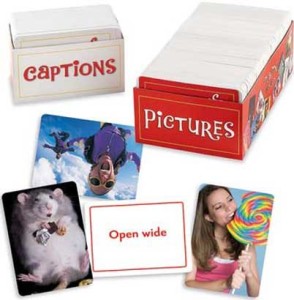
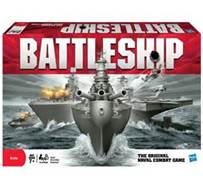










All of these games sound great! Thanks for including the pictures of the adjective cards in Funglish. Now I have to get them!
Thanks Kelly–I thought it would be a good idea to show everyone what the content of the games looked like—those adjective cards are great!
I’m so glad you linked up with an ‘older list!’ I need to stock up on some of these!
Thanks for linking up!
Jenna
Speech Room News
You’re welcome Jenna! It was a fun list to create. There really are so many great games out there and creative ways to use them in therapy! Looking forward to your next linky party!